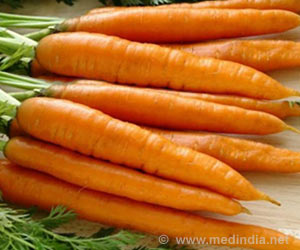- Carrot juice nutritional profile - (https://pubmed.ncbi.nlm.nih.gov/32083829/)
Health Benefits of Carrot
Carrot (Daucus carota subsp. Sativus), is a root vegetable available in various colors ranging from orange, purple, black, red, white, and yellow. It is cultivated in the European and Southwest Asian countries. Majority of carrots are now cultivated in China, and they are used in salads and soups, as well as in snacks, side dishes, and as essential ingredients in many recipes. Though the plant was originally cultivated for its leaves and seeds, the taproots are a delicacy these days. The roots contain high quantities of alpha and beta carotene, and are a good source of vitamin K and vitamin B6.
Carrots have various health benefits including improving the vision, reduction of cholesterol and signs of premature aging, and prevention of heart attacks and cancers. They are also beneficial for a healthy heart and skin, and aid in boosting the immune system and digestion.
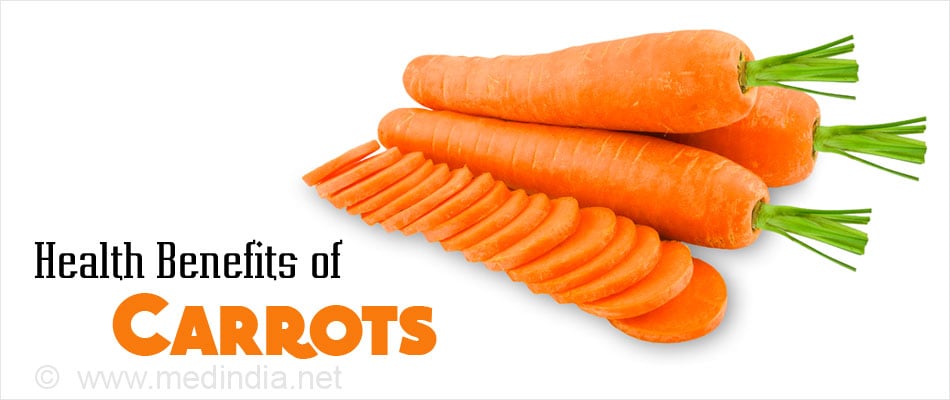
Prevention of Heart Disease: Researchers from Scotland revealed that cholesterol levels declined by an average of 11% when seven ounces of raw carrots per day are taken for three weeks. Since heart diseases and cholesterol levels are inter-related, it is suggested to consume sufficient amounts of carrot on a day-to-day basis to maintain a healthy heart.
Blood Pressure: Carrots being a good source of potassium acts as a vasodilator that relaxes the blood vessels allowing for an increased blood flow, thereby reducing the pressure on the blood vessels. High blood pressure is also linked to atherosclerosis strokes, and heart attacks.
Macular Degeneration: It was found out that people who ate carrots regularly had a 40% lower risk of macular degeneration compared with those who consumed less carrots in their diet. Beta-carotene in carrots undergoes an enzymatic reaction and breaks down into provitamin A that is associated with antioxidant capacity related to vision.
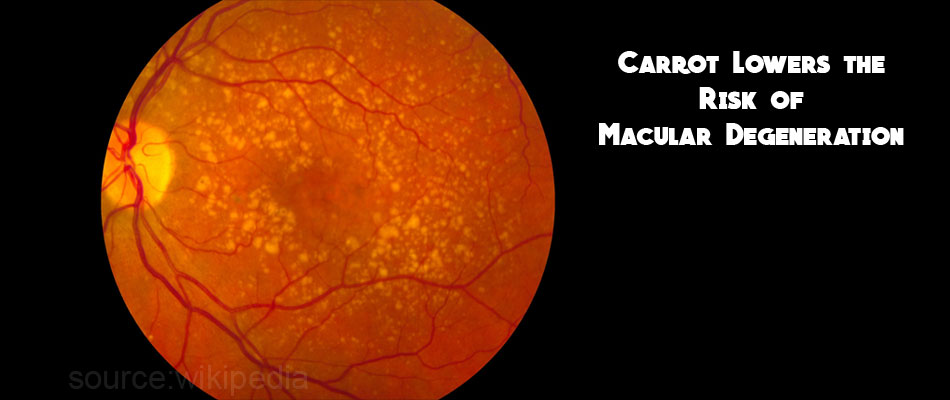
Immune Booster: Carrots being a rich source of vitamin C stimulates the activity of white blood cells (WBCs), thereby boosting the immune system.
Digestion: Carrots possess significant amounts of dietary fiber which help in maintaining a good digestive health. Fiber adds bulk to stools, stimulates peristaltic motion, and helps in the secretion of gastric juices. This reduces constipation and protects from colorectal cancer.
Prevents Cancer: Beta-carotene (3 mg in 1 carrot) in carrots reduces the risk of several cancers, notably lung cancer by more than 40%. It was also noted that women who ate raw carrots were less likely to develop breast cancer than those who did not eat carrots.
Oral Health: Carrots stimulate the gums and induce excess saliva which combats the bacteria and foreign bodies that results in cavities and halitosis.

Improves Eyesight: Being a rich source of vitamin A, carrots improve eyesight and prevent conditions like night blindness. Carotenoid pigments, lutein and zeaxanthin, constitute the main pigments found in the yellow spot of the human retina which protect the macula from damage by blue light, improve visual acuity and scavenge harmful reactive oxygen species.
Diabetes: Carrots being a rich source of carotenoids inversely affect insulin resistance and thus lower blood sugar. Carrots regulate the amount of glucose and insulin that is metabolized by the body.
Seasonal Allergies: Carrot juice cures numerous late summer ailments, like hay fever. It detoxifies blood and reduces inflammation. The juice clears heat and irritation from the respiratory tract, thereby giving relief from fall allergies.
Other health benefits of this superfood are that they have antiseptic qualities, act as laxatives, vermicides, act as a moisturizer for dry skin, and improve stomach and gastrointestinal health. Carrot juice has an alkalizing character which relaxes the skin and eyes. The beta-carotene metabolizes into vitamin A when it comes in contact with bile salts, thus nourishing the liver and purifying to the blood.
Is Carrot Juice Good for Hair Growth
Hair Growth: Hormones, genetics, and lifestyle all affect hair growth; no one diet can be a panacea.There is a popular belief that carrot juice can improve hair growth however there is no conclusive scientific evidence that drinking carrot juice would promote hair development.
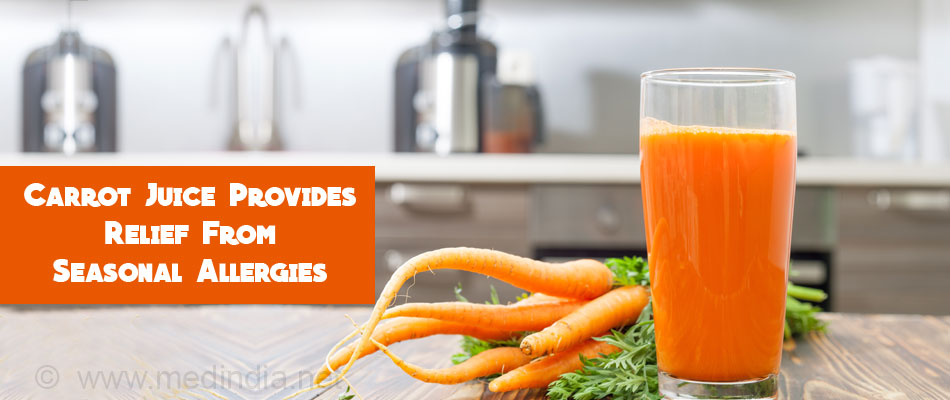
How to Incorporate Carrots in your Diet
Carrots have a sweetish taste and hence it can be easily incorporated into our favourite foods to make it a healthy meal! Carrots can be added to a vegetable assortment along with some spaghetti sauce, meatloaf, chili, or pizza. This vegetable packs flavor and adds color to the dish.
Rotis with veg curry is a staple dish in many Indian homes. Though being very healthy, this can become mundane, when taken on a daily basis and create a craving for tastier food. To satisfy our taste buds in a healthier way, opt for frankies with vegetable stuffing including carrots that would bring a sweetish taste to the dish.
A known fact is that noodles are a preferred diet by all kids. The best way to make noodles healthier is to add vegetables like carrots, beans, tomatoes, onions, and peas to the dish. These vegetables, not only make noodles healthier, but also increase the nutritional content of the dish and making it colorful and appealing.
Carrot Recipes
Spiced Baby Carrots
Ingredients
- 3 cups water
- ½ teaspoon cumin (optional)
- ½ teaspoon cinnamon
- 1 pound baby carrots
- 2 tablespoons margarine
- 3 tablespoons brown sugar or regular sugar
- ⅛ teaspoon salt
- 2 teaspoons lemon juice
Preparation
- In a medium-sized sauce pan, bring water, cumin, and cinnamon to a boil.
- Add carrots and cook until soft. Drain all water.
- Add brown sugar, salt, and lemon juice to the carrots and stir.
- Cook 3 to 4 minutes until the liquid is thick in consistency.
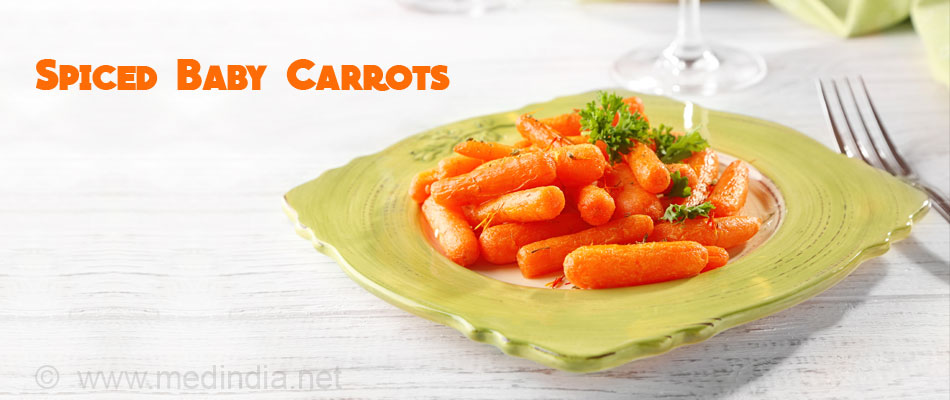
Crunchy Carrot Salad
Ingredients
- 1 pound raw fresh carrots, peeled and scrubbed
- ½ cup raisins
- 8 ounces low-fat vanilla or lemon yogurt
Preparation
- Mix all ingredients in a large mixing bowl.
- Cover and refrigerate for 1 hour.
- Toss again and serve.




